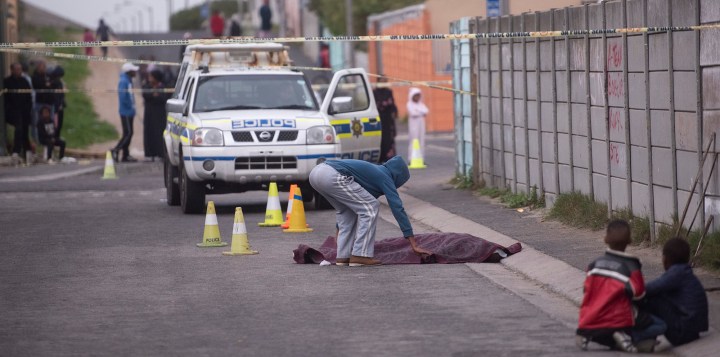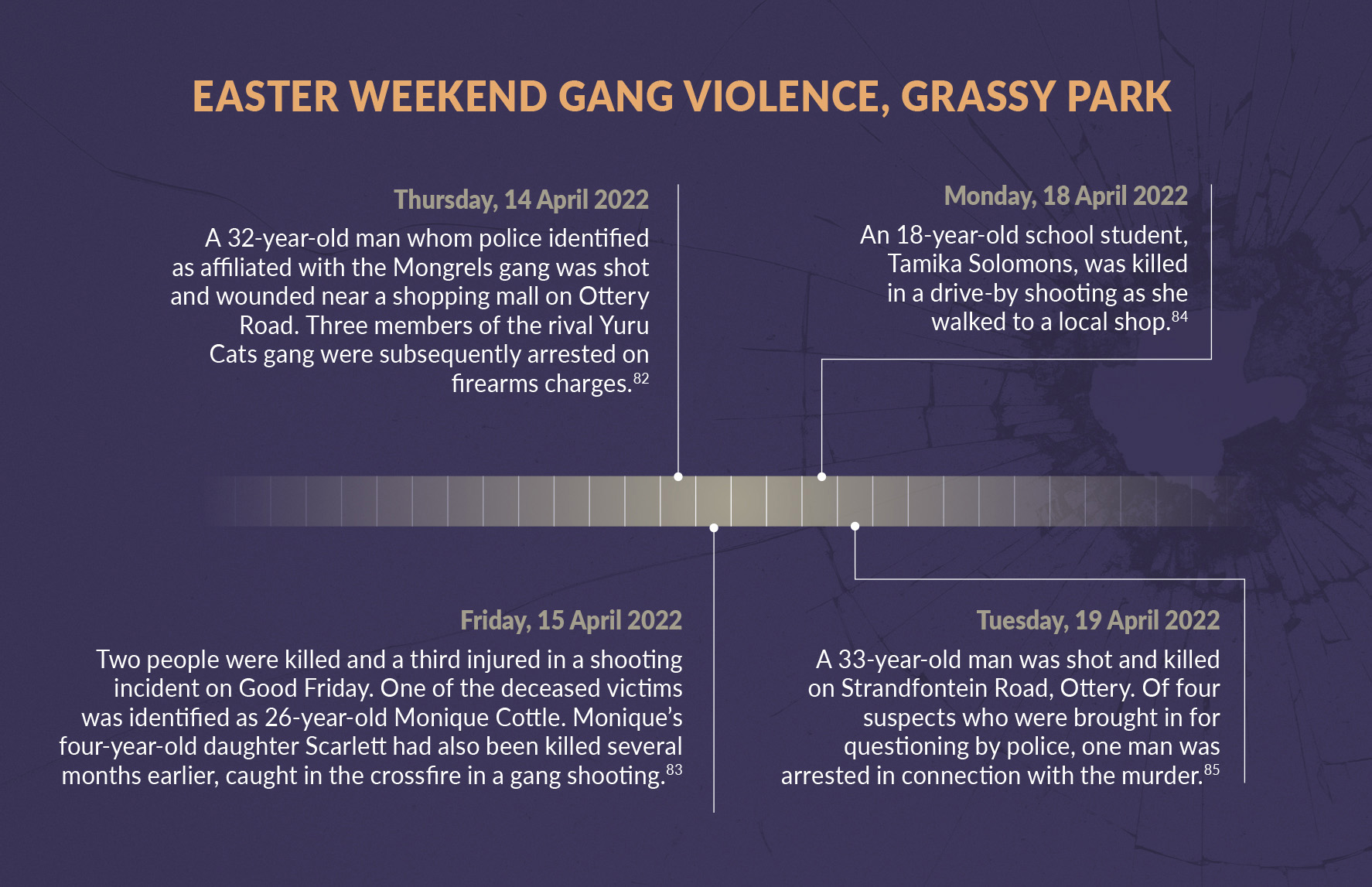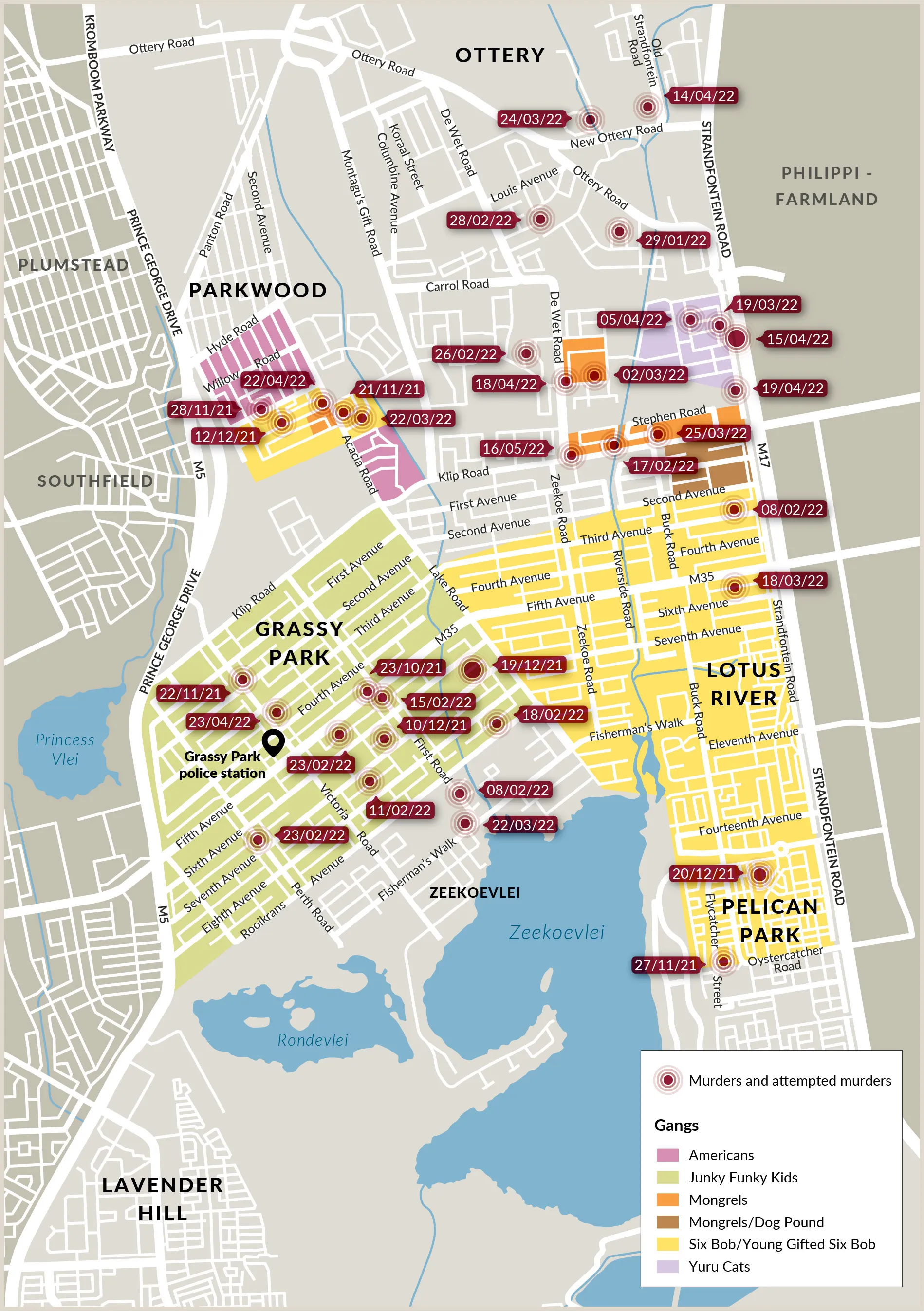ORGANISED CRIME OP-ED
Months of elevated gang violence at crisis levels in Cape Town’s Grassy Park and surrounds

Grassy Park’s Community Policing Forum reported that 51 people had been killed in the Grassy Park area as a result of gang violence in the financial year before April 2022. With 40 murders and attempted murders recorded since late October 2021, it seems the frequency of violence has picked up in recent months.
For residents of Grassy Park in Cape Town, April’s Easter celebrations and the holy month of Ramadan were marred by a spate of shootings in which four people were killed and two injured. What was not widely recognised in the media coverage of these shootings is that the Easter weekend was not an isolated event, but the latest flare-up in a period of elevated gang violence that has been harrying this close-knit community over recent months.
Between 24 October 2021 and 17 May 2022, there were 38 murders and two attempted murders within the jurisdiction of the Grassy Park police station, many of them gang-related. In an area of under 20km², this is a shocking concentration of violence.
Cape Town has, for many years, reported some of the highest homicide rates of any city in the world. Yet city-wide statistics do not show in detail the fact that violence is particularly acute in gang-affected suburbs such as Grassy Park. For comparison, these few months in Grassy Park saw almost the same number of murders recorded in the entirety of Switzerland in 2020.
Many of these murders are retribution killings among the area’s warring gangs. These groups jostle for control of territory for local drug sales, often assassinating rivals in drive-by shootings. This is shown in the geography of the violence: when murders are mapped against the contours of local gang territories, the vast majority of killings have taken place within identified gang territories or along borders between the turf of two gangs.
What is happening in Grassy Park is one, currently particularly volatile, example of the kind of gang dynamics seen elsewhere in Cape Town and several other areas in South Africa. Mapping out these killings can help understand the hidden dynamics and drivers of violence.
Yet, over the Easter weekend, several people thought to be unconnected to gangs became victims of gang shootouts. Among them was 26-year-old Monique Cottle, who had lost her four-year-old daughter Scarlett several months earlier when she was caught in the crossfire of a gang shooting.

Easter weekend gang violence of Grassy Park, Cape Town. (Graphic: Global Initiative on Transnational Organized Crime)
As the tragic case of Monique Cottle shows, the cost to the community is immense. The ripple effects of these shootings are far-reaching: from the intergenerational trauma inflicted on the families of those killed, to how insecurity and the threat of violence affect governance in the area.
Several gangs claim territory in Grassy Park. These include the widely known Americans gang, the Mongrels, a splinter group of the Mongrels known as the Dog Pounds, the Yuru Cats, the Junky Funky kids and the Six Bob gang, for which Grassy Park is the main base.

Figure 2 Gang territories and murders in Grassy Park from October 2021 to May 2022. (Graphic: Supplied by Global Initiative on Transnational Organized Crime)
The Six Bob gang — reportedly under the leadership of Desmond Swartz and his older brother Alfonso “Fonny” Swartz — has, since the early 2000s, been aligned with the Young Gifted gang as the Young Gifted Six Bob.
Since around 2015, the Young Gifted Six Bob has been aggressively taking over territory across the city, killing key opponents to wrest control of turf for the street-drug trade. The group now controls territory across other areas of Cape Town, such as Hanover Park, and has a reputation for ruthless violence.
The Six Bob stand out among Cape Town gangs for stealing vehicles and carrying out drive-by shootings. This aggression and the success with which the gang has been expanding its territory attest to its growing power. According to a recent police estimate seen by the GI-TOC, Swartz is thought to command up to 700 boys and young men as part of the gang, though we estimate that the true figure may be closer to 1,000.
There had been an uneasy ceasefire among these rival gangs in Grassy Park, which was broken when 17-year-old Sayed Johannes was killed on 5 April. This set off a spiral of retribution killings over the following weekend.
Grassy Park’s Community Policing Forum reported that 51 people had been killed in the Grassy Park area as a result of gang violence in the financial year before April 2022. With 40 murders and attempted murders recorded since late October 2021, it seems that the frequency of violence has picked up in recent months. At a meeting of the community policing forum in February 2022, local police chief Colonel Dawood Laing acknowledged that gang violence had erupted in the precinct and led to an increase in shootings — an increase that has not yet abated.
City authorities have deployed specialist personnel from city-wide law enforcement agencies in response to the latest spate of violence to support local police. This includes personnel from the specialist Anti-Gang Unit, who have made use of stop-and-search powers on the streets and conducted raids of houses identified by local police as hotspots of gang activity. These searches prompted complaints at a recent Community Policing Forum meeting, as at least one resident protested that her home — misidentified by police as a gang hideout — had been subject to repeated searches.
Officers from the Law Enforcement Advancement Programme Reaction Unit have also been deployed to Grassy Park. This unit was established in February 2022 and has been operating in areas where gang violence is seen as most acute.
At the time of writing, arrests have only been made in relation to one of the Easter weekend shooting cases. Three members of the Yuru Cats gang were arrested on firearms charges after the shooting of an alleged member of the Mongrels gang on 14 April. However, in relation to the multiple shootings that claimed two lives and left a third injured, no arrests have yet been made. Although several witnesses were at the scene, none have come forward to identify the shooters to police.
Securing witnesses who can testify in gang-related shootings is a perennial, countrywide obstacle to successful prosecutions, not just localised to Grassy Park. While there has been widespread community outcry in response to the recent killings, individual witnesses fear that they could be targeted for speaking out. Grassy Park police have publicly called for more community cooperation and for witnesses to come forward, but fear still ensures widespread silence.
In February, Alderman JP Smith, a member of the Mayoral Council for the City of Cape Town responsible for safety and security, acknowledged at a meeting that the lack of convictions relating to gang shootings in Grassy Park is a concern, saying that the South African Police Service (SAPS) is planning to recruit and train more detectives to address the backlog and deal with the low rate of convictions.
Grassy Park police have also told the community that they are aiming to implement South Africa’s Prevention of Organised Crime Act (Poca) more frequently in instances of gang-related murders, rather than prosecuting these cases as common-law offences. However, police also warned that prosecuting under Poca can be very challenging, owing to the type of evidence required to prove that the violence is related to organised crime. From a practical point of view, police argue that proving a Poca offence may take significantly more time and resources.
The community’s view of the police response is a microcosm of the conflicted relationship that residents in gang-affected areas have with government and law enforcement. These essential services have a frontline role in stemming gang violence but are often crippled by corruption and service delivery failures.
Police in Grassy Park face significant violent backlash when carrying out their work, as evidenced by recent incidents in which officers attempting to carry out arrests have been attacked and stoned. A group of residents picketed the Grassy Park police station in late April calling for the dismissal of Grassy Park SAPS commander Colonel Laing in light of the recent violence and corruption within the precinct. Six officers in the Grassy Park precinct have recently been dismissed (including a detective working on many gang-related cases). Another four are currently suspended on the outcome of a corruption-related disciplinary hearing, making up a not-insignificant proportion of the area’s police force.
Yet while some picketed the station, many others took to social media to express support for Laing, arguing that the commander cannot be held responsible for the chronic, systemic causes of gang violence, and claiming that he has in fact led a firm stance against corruption in the precinct. Others have called for more radical action such as deployment of the army, as seen in July 2019 in response to a wave of gang violence.
Laing himself has opposed the allegations against him, stating that he is “going nowhere” and telling local newspaper the Daily Voice that “many of the people making these claims are just covering for the gangsters”.
Local communities also took matters into their own hands during the outbreak of violence, for example by building roadblocks in order to control the movement of vehicles passing in and out of key areas, in an attempt to prevent more drive-by shootings. However, these roadblocks have also made it more difficult for law enforcement vehicles to move around the area.
The violence and insecurity in Grassy Park are not just a challenge for police. The area has been designated by police as a “red zone”, referring to the fact that ambulances cannot freely travel into the area without a police escort. Ambulances and paramedics have been the target of attacks: in some cases, these have simply been robberies, but in other cases, gang members have deliberately prevented ambulances from reaching the victims of gang-related shootings. This affects the ability to deliver life-saving care to people in these “red zones”.
Additionally, agencies such as social services were suspended during the pandemic and have yet to restart operations in Grassy Park, meaning that the essential work these agencies do to support vulnerable families, including those affected by gang violence and drug use, is not taking place.
There is no sign that the violence will abate soon. Instead, gangs are already on a recruitment drive in Grassy Park, bringing in more young children to make up for lost gang members (those who have been killed and those who have been arrested). More bloodshed is expected as new recruits are initiated into the gang by carrying out their first shootings. Gang members in the area report an increased demand for firearms, and an increase in the number of car theft cases has been seen in the courts, reflecting the increased frequency of drive-by shootings.
As gangs have members spread across different Cape Town areas, a spillover of retribution killings into other areas could be expected. The killing of 23-year-old Esa Manuel, aka “Hadjie”, an alleged gang leader in Hanover Park in late April, supposedly in connection with the Grassy Park violence, suggests that this may already be happening.
We have monitored the number of killings in Grassy Park, mapped gang territories and looked at the correlations between the two. Yet this data cannot capture the impact that these killings have on the victims’ families and immediate communities. Gang violence affects all aspects of life in Grassy Park, including local security and social cohesion, and the provision of essential services and governance.
The recruitment of younger gang members to repeat the same inter-generational cycles of violence sustains these dynamics and leads to communities such as Grassy Park becoming further marginalised. DM
This article appears in the Global Initiative against Transnational Organized Crime’s monthly East and Southern Africa Risk Bulletin. The Global Initiative is a network of more than 500 experts on organised crime drawn from law enforcement, academia, conservation, technology, media, the private sector and development agencies. It publishes research and analysis on emerging criminal threats and works to develop innovative strategies to counter organised crime globally. To receive monthly Risk Bulletin updates, please sign up here.



















 Become an Insider
Become an Insider
Horrific details, question is how to curtail gangs and make a dent in their growth and their profits?Please also do an analysis of STRAND for the last 5 years, as regards turf killings and gang killings,it goes unnoticed it seems, although their is a turf war been going on for a few years now.